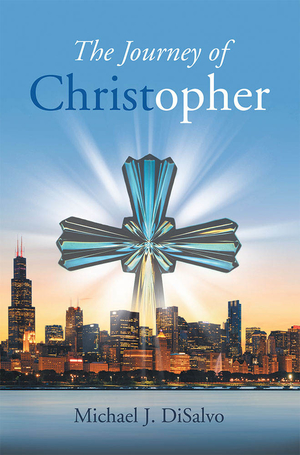
The Journey of Christopher, a new novel by author Michael J. DiSalvo, presents a refreshing new parable of wavering faith and personal challenges that has the potential to engage a new generation of believers.
The character at the center of this story is Christopher, a young man experiencing his first real crisis of faith as a loyal Christian. Following a series of unexpected, but emotionally challenging events, he is suddenly wracked by doubt in the meaning of Christmas, and some of the fundamental tenets of his beliefs. Asking himself the classic questions of why a merciful and loving god would allow such terrible things to happen to good people, he is rescued from his dark thoughts by a perfectly timed spiritual guide.
What begins as a realistic story of moral questioning quickly shifts into more of a fantasy tale, one imbued with powerful talismans and evil villains who seek to capture the endless power of faith and virtue. Partnering with other holy warriors, Christopher comes face to face with real danger, tangible manifestations of his doubt, and personal struggles, which he must overcome through a power he always knew that he possessed.
While this may sound like a familiar premise for a religious parable, DiSalvo finds a way to build a credible and enjoyable story around these traditional lessons. However, in a heavily symbolic story such as this one, in which the young protagonist is a relatively transparent stand-in for a savior, even bearing “Christ” in his name, it is essential for an author to consider his level of subtlety. Placing trust in a reader to understand the underlying meaning, without being too obvious about the character’s obvious parallels, would make the book stronger, even for religious readers.
While the book is no doubt aimed at readers of Christian fiction, the storytelling sometimes wavers between allegory and outright proselytizing, as if DiSalvo is on the one hand trying to reach a broader audience, while still preaching a certain message. This unevenness in tone and focus does affect the overall flow of the story, as there are elements in the plot that could more delicately shape these allusions and lessons. Additionally, given there is such a significant leaning towards a Christian path, it takes some of the tension out of the story if he is going to regain his path, particularly when that suspense is primarily built around a “doubting Christopher.”
The plot is well-constructed, leading the reader to moments of reflection on notions of faith and personal struggle, but the dialogue – crucial to book’s overall messaging – feels stilted, as though the characters themselves are reading from a script. Without organic reactions and natural-flowing chats, readers can grow disinterested and disbelieving. Aside from those larger critiques, a general editing sweep is required, as some of the sentence structure is repetitive, and certain characters could do with some slight tweaking to give them more dimension.
Despite these issues, The Journey of Christopher is a unique hybrid of fiction and parable, one with a clear intention and end message for readers to embrace, but also a story that acknowledges common obstacles for those bearing strong faith. It is a sensitive and timely work, the novel has enough twists to engross those seeking a straightforward and uplifting story.
Book Links
STAR RATING
Design
Content
Editing
Get an Editorial Review | Get Amazon Sales & Reviews | Get Edited | Get Beta Readers | Enter the SPR Book Awards | Other Marketing Services























Leave A Comment